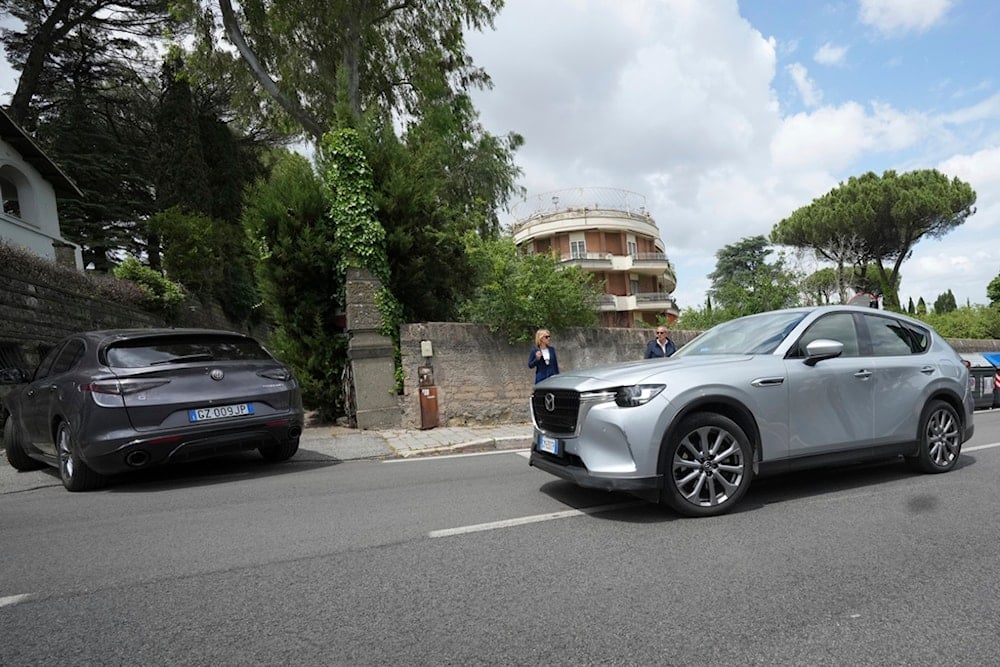US, Iran agree to meet, hold talks as they remain 'constructive'
The US and Iran agree to meet again after the fifth round of “constructive” nuclear talks in Rome, the State Department confirms.
-

Delegates arrive at the Omani Embassy in Rome after a closed-door meeting between Iranian and US delegations to discuss Tehran's rapidly advancing nuclear program, Friday, May 23, 2025. (AP)
The United States and the Islamic Republic of Iran have agreed to hold another round of discussions soon, following what US officials described as a "constructive" fifth session of nuclear-related talks held in Rome, State Department spokesperson Tammy Bruce said on Tuesday during a press briefing.
The spokesperson said US senior advisor and special envoy Steve Witkoff, along with Policy Planning Director Michael Anton, led the American delegation in the May 23 meeting.
“The discussions were both direct and indirect and lasted over two hours,” Bruce said, emphasizing that “the talks continue to be constructive.”
She added that both parties had agreed to reconvene in the near future, though no specific date was disclosed.
The announcement signals cautious optimism amid heightened regional tensions and political pressure from US allies, including “Israel,” which has expressed growing concern over diplomatic outreach to Tehran.
Iran warns UK over nuclear stance
Iran’s former deputy foreign minister, Abbas Araghchi, criticized the UK on Tuesday for allegedly demanding "zero enrichment" in Iran, calling it a violation of the Nuclear Non-Proliferation Treaty (NPT) and the UK’s obligations under the JCPOA.
Iran has maintained multilateral engagement with the UK and other European JCPOA participants in good faith, even as the U.S. continues to show no interest in getting them involved in the ongoing negotiation process.
— Seyed Abbas Araghchi (@araghchi) May 27, 2025
If the UK position is 'zero enrichment' in Iran—in violation…
Araghchi stated on X that Tehran has continued good-faith engagement with European signatories, while the US excludes them from ongoing negotiations. He warned that if the UK's stance remains unchanged, "there is nothing left for us to discuss on the nuclear issue."
Advances being made in talks
The Rome session marked the fifth round of engagement between the Trump administration and Iranian representatives as Washington seeks to reframe its nuclear diplomacy following years of breakdown and confrontation.
While the contents of the talks remain undisclosed, the emphasis on their “constructive” nature may indicate tentative progress on sensitive issues, including uranium enrichment limits and sanctions relief.
The continuation of US-Iran dialogue comes amid a wider strategic recalibration in the region, with efforts underway to prevent military escalation and reestablish communication channels that could lay the groundwork for a broader diplomatic resolution.
Trump tells Netanyahu off
Israeli media reported on Tuesday that US President Donald Trump issued a stern warning to Israeli Prime Minister Benjamin Netanyahu during a phone call last week, cautioning him against taking any actions that could derail ongoing nuclear talks between Washington and the Islamic Republic of Iran.
According to a senior White House official quoted in the reports, both Trump and other top US administration figures have expressed growing concern in private discussions that Netanyahu may be considering a military strike on Iranian nuclear facilities or other disruptive measures aimed at sabotaging the diplomatic process.
The phone call between Trump and Netanyahu reportedly took place last Thursday, following a deadly shooting incident in Washington in which two Israeli embassy staff were killed.
Trump seeks 'diplomacy'
During the call, Trump reiterated his commitment to a diplomatic resolution with Tehran, stating that he “does not want anything to stand in the way of that” and emphasized that “this is not the time to escalate tensions while efforts are underway to resolve issues.”
Although Trump made it clear that “the second option remains on the table,” a veiled reference to potential military action, he underscored his preference to first pursue diplomatic channels to determine whether a peaceful agreement can be reached.

 4 Min Read
4 Min Read









